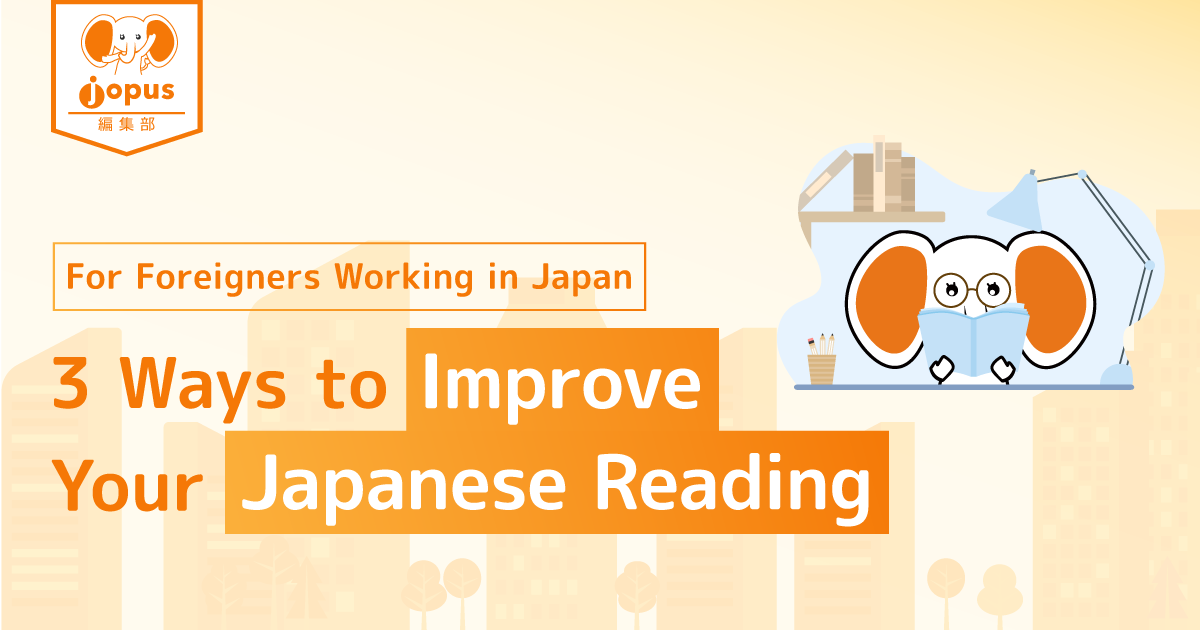There are many situations when foreigners working in Japan are required to have Japanese reading (comprehension) skills in business scenes. Not only do you need to understand business documents such as emails and meeting minutes, but in some jobs, you need to read difficult contract agreements and documents. In this article, we will introduce three ways to improve your Japanese reading.
1. Change the language setting of your smartphone and PC to Japanese
One of the easiest ways to improve your Japanese reading is to change the language setting of your smartphone or PC to Japanese. Since many people spend a long time on their phones and PCs every day, changing the language setting to Japanese will naturally increase one’s access to Japanese. In addition, technical terms of PCs and software are not on Japanese textbooks but are sometimes required in business situations. It will also be easier to communicate with your Japanese colleagues about the usage of a PC or software if the language setting of your PC is Japanese.
Other than the system language of your smartphone or PC, we recommend setting the language of web services you frequently use such as Google to Japanese and search in Japanese. Also, on social media such as Facebook and twitter, try following Japanese news accounts, celebrities and influencers you are interested in. You will naturally learn business terms, popular Japanese phrases and internet slang. If you are a gamer, try playing games in the Japanese setting. Many Japanese games have voices for the characters’ dialogues in Japanese, so you can improve your listening skills, too.
2. Intensive reading: Reading Japanese news and essays
Intensive reading is a studying method that involves reading short sentences deeply and thoroughly. For intensive reading, try setting your goal to be able to understand and memorize all the words and grammar. If you find any unknown Japanese words in the text, it is recommended to look them all up first. Even some Japanese you already know may have different meanings and nuances in some sentences, so it is safe to look up if you are not sure of the meaning. In addition, reading the sentences aloud is also a good practice. For intensive reading, it is effective to read sentences that you understand 60-70% of them.
Japanese news and essays are recommended for intensive reading. NHK news is especially recommended for news. This is because there are two versions, one in easy Japanese for foreigners and the other for Japanese people, so you can choose the news that is suitable to your Japanese level. For advanced learners, why not try 日経新聞(にっけいしんぶん/nikkei shimbun)news which explains the Japanese economy.
For essays, we recommend the Asahi Shimbun’s 『天声人語』(てんせいじんご/tensei jingo)column on recent news and topics, and the Nikkei Shimbuns’『 春秋』(しゅんじゅう/shunju). They are often used in academic tests for Japanese as texts of reading comprehension questions, so you will be able to learn proper Japanese.
Those who love literature can use a collection of short stories or a Japanese language textbook for Japanese students for intensive reading. Japanese language textbooks are divided into different levels of difficulty from elementary to high-school, so you can choose a textbook that suits your level whether you are a beginner or an advanced learner.
3. Extensive reading: Reading novels and business books in Japanese
Extensive reading is a study method that involves reading many sentences in a superficial way. The aim of extensive reading is not to understand each word perfectly but to understand the whole image of a single sentence or a book. You only need to know the brief meaning, and look up the words only necessary to understand the meaning of the whole text, and keep reading without worrying about the other words that you don’t understand. In addition to the quantity of reading, it is important to read a variety of genres such as novels, essays and business books. Reading sentences whose meaning you can understand 80-90 % is recommended for extensive reading.
If you find it difficult to read Japanese novels and business books, we recommend you re-read books in Japanese that you have already read in your native language or the original stories of movies or dramas you have watched. For beginners, reading comics in Japanese can also be useful.
Business books
『7つの習慣』The 7 Habits of Highly Effective People: A globally read business book that you can read in combination with the one in your native language. Recommended for intermediate to advanced learners.
『入社1年目の教科書』 Nyusha Ichinenme no Kyokasho: Although this book is written for Japanese people, it is also useful for foreigners as it describes what you should know when you work for a Japanese company for the first time. Recommended for intermediate to advanced learners.
Novels
『ハリー・ポッター』Harry Potter: The wording is simple and the story is interesting, and it is especially easy to read for those who have watched the movie. Recommended for beginners to intermediate learners.
『ノルウェーの森』Norwegian Wood: Since wordings in Haruki Murakami’s works is similar to English in many ways, it is easier to read for English speakers. Recommended for intermediate to advanced learners.
Summary
What did you think? Reading requires daily efforts. Therefore, choosing the texts and books in areas of your interest is the key to continue for a long time. We recommend that you use the three methods in this article at the same time, so try to read many Japanese texts and books.
Learning Japanese
Business Japanese
List of ways to look for jobs in Japan
- Recruitment Agency for Expats in Japan
- Job Board for Expats in Japan
- Search for jobs by occupation in Japan
- Search for jobs by industry in Japan
Job Hunting Guide for International Students














